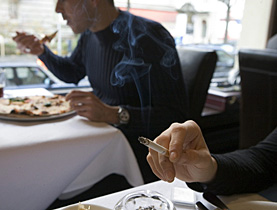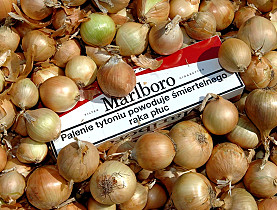Talks aim to stub out illicit tobacco trade

The growing illegal trade in cigarettes costs governments billions of dollars, causes huge health problems and finances militant groups, say activists.
The claims were made as 130 countries resumed talks in Geneva this week on expanding an international anti-smoking treaty to clamp down on the trade in black market cigarettes.
According to a report published this week by the International Union against Tobacco and Lung Disease, one in nine cigarettes – or 657 billion cigarettes a year – is sold illicitly by organised crime gangs.
This amounts to $40.5 billion (SFr71.7 billion) in unpaid tax revenue, with losses falling disproportionately in low and middle-income countries – 9.8 per cent in wealthy countries compared with 16.8 per cent in poor ones. Eradicating illicit trade could save over 160,000 lives a year, the authors claim.
According to Ian Willmore of the Framework Convention Alliance, a network of some 350 anti-tobacco campaign groups, the nature of tobacco smuggling has changed but it still remains a major problem.
“In the past there was evidence of large tobacco firms directly involved in tobacco smuggling, partly to get into new markets and partly to undermine tax policies,” he told swissinfo.ch. “But now we have reason to believe that they have withdrawn from that and there is a new problem of illegally manufactured cigarettes and the movement of small producers’ products.”
Large cigarette firms want to “clean up their act” and are moving towards supporting the control of contraband cigarettes, but there is still a big problem with overproduction of cigarettes in certain countries and duty-free cigarettes routinely turning up in markets they are not destined for, say experts.
Tobacco control measures
Parties to the World Health Organization’s 2003 Framework Convention on Tobacco Control are hoping to reach agreement in Geneva on a number of key issues as part of the first global protocol on illicit trade in tobacco products.
The ten-day preparatory negotiations are examining questions such as globally coordinating sentences for smuggling offences and measures against internet sales.
Despite an increasingly complicated negotiating text, there is strong political pressure to find an accord, with support from major parties like Canada, the European Union and Brazil.
But obstacles remain over exemption requests by certain national tobacco industries, clear definitions of tobacco products, attempts to evade the licensing of the tobacco industry and a clear tracking system for cigarettes.
As for the cigarette firms some say they support moves to crack down on illicit competitors, who they claim are flooding the market with cheap, low-quality imitations or no-name packs.
Dragging feet?
Switzerland is officially present at the meeting as an observer, as it has signed the convention but not yet ratified it, unlike 164 other states.
This remains an objective in the new 2008-2012 national anti-smoking strategy, said Sabine Helfer, spokesperson for the Federal Health Office.
“But Switzerland can only ratify international accords when the required legal framework is in place,” she explained.
Unfortunately this situation is unlikely to change in the next five years due to resistance over a national ban on advertising cigarettes in Switzerland, said Thomas Beutler, a scientific advisor with the Swiss Association for Smoking Prevention.
“There’s lots of pressure, partly by the advertising industry pushed by the tobacco industry,” he noted.
But Switzerland is generally making progress in trying to control tobacco use, he added, pointing towards cantonal smoking bans and the graphic health warnings on packets to be introduced from January 1, 2010.
Swiss smuggling ring
Question marks still remain over Switzerland’s role in the global cigarette smuggling trade, however.
The Federal Customs Office said the number of tobacco smuggling offences in Switzerland rose by 20 per cent between 2003 and 2007, while serious offences “increased tenfold” from eight to 82.
According to the Federal Police Office’s 2008 domestic security report, Italian criminal organisations like the Camorra and the Sacra Corona Unita have used Switzerland to launder money from cigarette smuggling operations, and criminal groups from southeastern Europe have “branched out” into smuggling.
A major smuggling trial is currently underway in Bellinzona, in Italian-speaking Switzerland.
Nine defendants, including four Swiss, are accused of having laundered more than $1 billion from tobacco smuggling between Montenegro and Italy from 1994-2001.
Money was alleged to have been laundered through brokers and money changers based in Lugano, Switzerland, and deposited in Swiss banks. A verdict is due on July 8.
Simon Bradley in Geneva, swissinfo.ch
In 2007 12.5 billion cigarettes were sold in Switzerland.
Also in 2007, 29% of 14 to 65-year-olds were smokers – 33% of men and 24% of women. Switzerland, Hungary, Poland and Ireland are the highest consumers of tobacco products per head in Europe.
This rate has dropped from 33% in 2001 (37% men, 30% women).
Smoking causes 8,000 premature deaths each year in Switzerland.
Priorities: by 2012 reduce the number of smokers in Switzerland from 29% to 23%; reduce the number of 14 to 19-year-olds who smoke from 24% to 20%; reduce the number of people exposed to over seven hours of passive smoke from 27% to 5%.
Main objectives: improve knowledge of the dangers of smoking and acceptance among the general public of prevention messages; adapt Swiss law to conform with health negotiations with the European Union; ratify the WHO Framework Convention on Tobacco Control; increase taxes on tobacco; control passive smoking via a federal law; cantons to pursue efforts to promote the dangers of smoking; discourage young people from starting smoking; encourage smokers to stop smoking;
A study by the Washington-based US Centre for Public Integrity identified China, Paraguay and Ukraine as top “smuggling hubs”, where either illegally produced counterfeits or contraband excess production from legal factories were fuelling black markets around the world.
It is estimated that China is responsible for up to 80 per cent of all counterfeit cigarettes in the European Union and 99 per cent of those sold in the United States.
The researchers also claim that “half a dozen terrorist” or militant groups, including the Pakistani Taliban, Al-Qaeda in the Islamic Maghreb, Hezbollah, left-wing FARC rebels in Colombia and the Real IRA in Northern Ireland, rely on black market tobacco for revenue.

In compliance with the JTI standards
More: SWI swissinfo.ch certified by the Journalism Trust Initiative














You can find an overview of ongoing debates with our journalists here . Please join us!
If you want to start a conversation about a topic raised in this article or want to report factual errors, email us at english@swissinfo.ch.